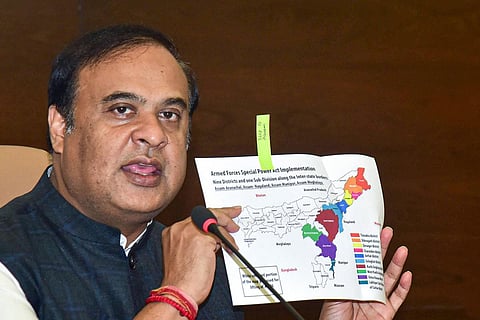

Union Home Minister Amit Shah on Thursday, March 31, announced reduction of the disturbed areas imposed under the Armed Forces (Special Powers) Act (AFSPA) in Nagaland, Assam and Manipur from April 1, after decades. A home ministry spokesperson, however, said the decision does not imply that the AFSPA has been completely withdrawn from the three insurgency-hit states but will continue to be in force in some areas of the three states.
The move came three months after the Union government constituted a high-level committee to examine the possibility of lifting the AFSPA in Nagaland where 14 civilians were killed by the army in December 2021 in a case of "mistaken identity". In a series of tweets, Shah said: "In a significant step, GoI (Government of India) under the decisive leadership of PM Shri @NarendraModi Ji has decided to reduce disturbed areas under Armed Forces Special Powers Act (AFSPA) in the states of Nagaland, Assam and Manipur after decades." The home minister said the reduction in areas under AFSPA is the result of the improved security situation and fast-tracked development due to the consistent efforts and several agreements to end insurgency and bring lasting peace in Northeast by the Modi government.
The AFSPA has been in force for decades in the three Northeastern states. The AFSPA allows security forces to conduct operations and arrest anyone without any prior warrant besides giving immunity from arrest and prosecution to the security forces if they shoot someone dead. There have been protests and demands for the complete withdrawal of the law from the Northeast as well as Jammu and Kashmir for its alleged "draconian" provisions.
Manipuri activist Irom Chanu Sharmila fought against the law by remaining on hunger strike for 16 years, before ending it on August 9 in 2016. The disturbed area notification under AFSPA was completely removed from Tripura in 2015 and Meghalaya in 2018. The disturbed area notification has been in force in Assam since 1990. Due to the significant improvement in the situation, the AFSPA is being removed with effect from April 1 completely from 23 districts and partially from one district of Assam.
The disturbed area declaration has been in force in all of Manipur (except Imphal municipality area) since 2004. With Thursday's decision, 15 police station areas of 6 districts of Manipur will be excluded from the disturbed area notification with effect from April 1. In 2015, AFSPA was in force in 3 districts of Arunachal Pradesh, 20 km belt of Arunachal Pradesh along the Assam border and in 16 police station areas in 9 other districts of the state. This has been gradually reduced and the disturbed areas notification is currently applicable in only 3 districts and in 2 police station areas in 1 other district of Arunachal Pradesh.
The disturbed area notification has been in force in the whole of Nagaland from 1995. The Union government has accepted the recommendation of a committee constituted in this context for withdrawal of AFSPA in a phased manner.
The disturbed area notification is being withdrawn from 15 police stations in 7 districts in Nagaland with effect from April 1. The killing of 14 civilians raised tensions in Nagaland, where people protested for weeks for the withdrawal of the AFSPA.